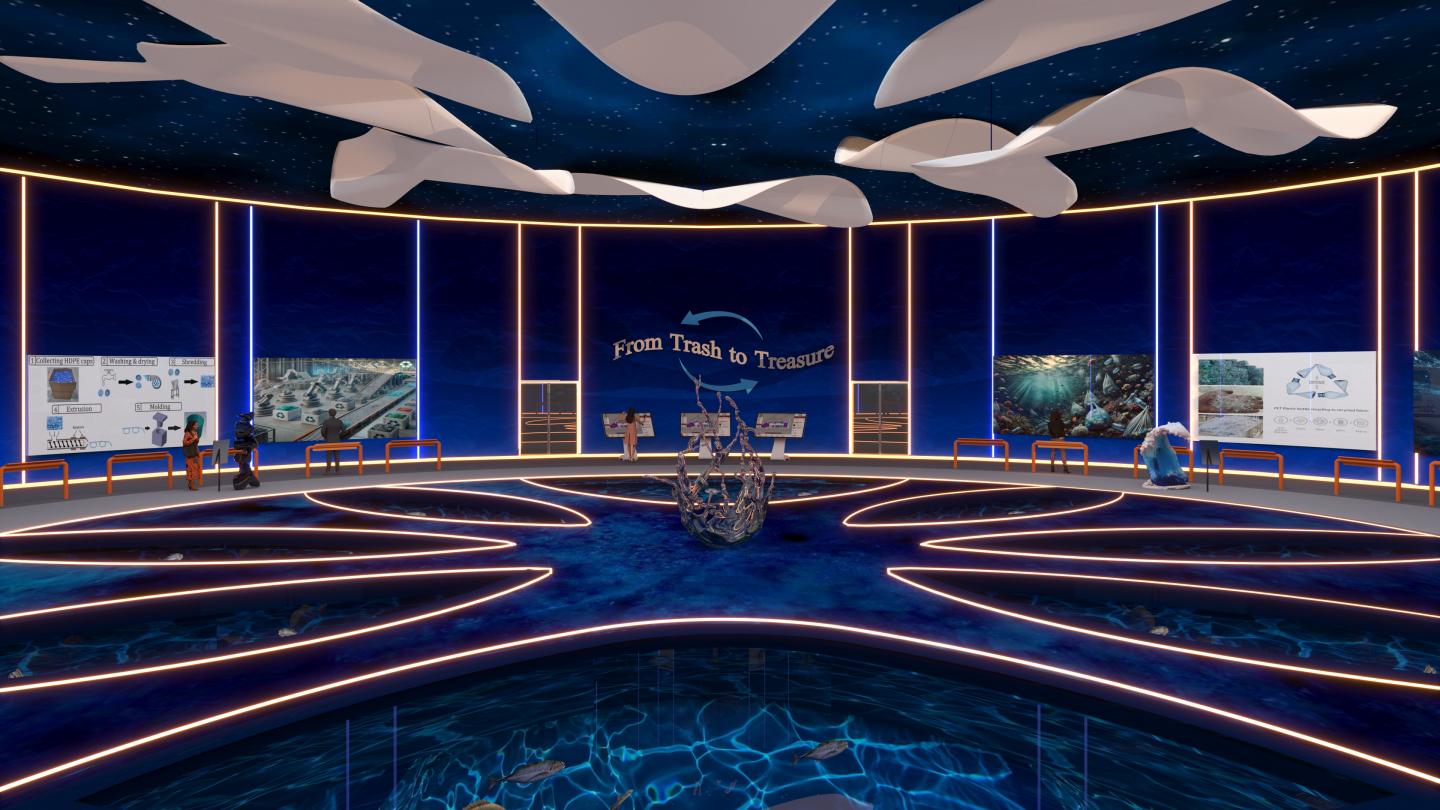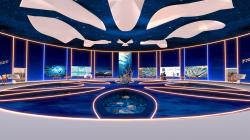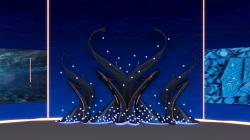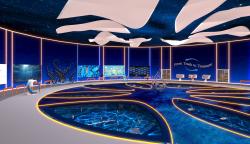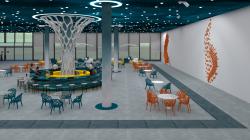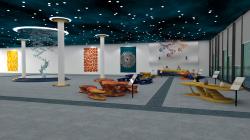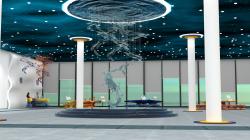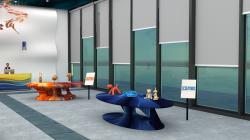TreplasT is a bold Interior design project in Sharm El-Sheikh, Egypt. It shows how interior spaces can serve as both educational and emotional tools for environmental change. Designed to spread awareness through informative interactive screens, community engagement in the coffee shop which gives users the chance to talk about their experience ,and a retail space to help users take their first step in using and exploring the uses of upcycled plastic in interior design. The project showcases the aesthetic and structural potential of upcycled plastic while promoting sustainability.
The term TreplasT represents the upcycling cycle, it starts and ends with T. The name itself is trees, treasure, and plastic combined.
From trees, we support the environment.
From plastic, we aim to upcycle.
From treasure, we create value.
TreplasT promotes sustainability through an ongoing cycle.
Concept:
"From Trash To Treasure"
TreplasT believes that plastic waste can be turned into effective tools for education, creativity, and social change. Inspired by coral reefs, which are nature's own design, this center combines nature-inspired design and environmental responsibility. It shows the harmful effects of plastic on marine ecosystems and highlights our ability to fix it.
By using upcycled plastic as the main material for furniture, flooring, cladding, and sculptural installations, the space itself delivers the message. Visitors do not just learn about upcycling; they walk on it, sit on it, and shop from it. The immersive design featuring responsive lighting, ocean sounds, and emotionally impactful sculptures takes users on a journey of awareness, making the hidden damage from pollution noticeable, tangible, and unforgettable.
zones:
Zone 1: interactive storytelling digital screens exhibition, in addition to sculptures made of upcycled plastic to show it's texture and fixability. This zone is completely blue representing a calm ocean, once human motion is detected it turns orange representing danger. once the user leans on the seat to learn about upcycling the led turns back to blue as they are starting to make a difference.
Zone 2: Coffee Shop, featuring furniture and lighting inspired by coral reefs all from upcycled materials.
Zone 3: Retail Area, where visitors can interact with upcycled products, each marked with its environmental impact.
Every design choice, from coral-like shapes to sensory elements like ocean sounds, brings the sea's essence into the experience. TreplasT sees sustainability not as a limitation but as a key part of the design process.
Sustainable Development Goals:
SDG 12 – Promotes upcycling and sustainable plastic use in all design elements.
SDG 14 – Raises awareness about marine pollution and protects life below water.
SDG 11 – Creates a sustainable, educational space that serves the local community.
SDG 13 – Inspires climate-conscious behavior through environmental storytelling.
SDG 4 – Provides hands-on education about recycling and environmental protection.
2024
Title: TreplasT – Plastic Upcycling Artistic Awareness Center
Location: Sharm El-Sheikh
Area: Approximately (12,100 m²)
Systems used:
Lighting System
Motion-activated LED lighting, pendant lights, and ambient star ceiling effects.
Ventilation System
Air diffusers in the café for fresh airflow and visitor comfort.
Multimedia & Sound
Interactive screens and immersive soundscapes (ocean and rain sounds).
Floor Zoning System
Color-coded flooring for easy navigation and visual clarity.
Sustainable Material System
Upcycled plastic used throughout furniture, cladding, and décor.
Educational Tagging
Product labels display environmental impact and material source.
Zone 1: "PlastiSea," Centerpiece Exhibition Zone
Function:
Artistic space focused on plastic pollution and marine life education.
Design Elements:
Sculptures made from upcycled plastic.
LED lights that change color with motion.
Floor color zoning to guide visitors and highlight exhibition content.
Aquarium visuals showing the difference between healthy and endangered ecosystems.
Materials:
Upcycled plastic for furniture, sculptures, and flooring.
Acrylic panels, LED lights, and sensor-activated technology.
Flooring varied by material tone and reflectivity for clarity.
Technology:
Motion sensors at the entrance to trigger LED changes.
Interactive media screens.
Immersive soundscapes featuring underwater and ocean sounds.
Zone 2: Coffee Shop
Function:
A public space for relaxation and socializing that supports the sustainability concept through design.
Design Elements:
Coral reef-inspired barista station and columns.
Pendant lights resembling marine shapes.
Seating and tables shaped like abstract forms of coral.
Air diffusers for freshness and comfort.
Materials:
Furniture and lighting made entirely from upcycled plastic.
Textured wall cladding using recycled plastic that looks like schools of fish.
Technology:
Ventilation systems with air diffusers.
Pendant lighting installation.
Zone 3: Retail Space
Function:
Sells upcycled plastic furniture, lighting, sculptures, and accessories.
Design Elements:
A central sculpture that resembles fluid ocean waves, highlighting transparency and the flexibility of plastic.
A star ceiling and audio system for an immersive experience.
Display shelves with tags explaining each product’s environmental impact.
Floor-level rain-inspired lighting to emphasize purity and consequences.
Materials:
Upcycled plastic for all display items: vases, chairs, cladding, lighting, and tables.
Transparent elements to showcase plastic’s transformative potential.
Porcelain floor tiles (90×180 cm) for durability and elegance.
Technology:
Ambient audio system playing sounds of the sea.
Interactive tags displaying statistics, like the amount of plastic reused.
Lighting and ceiling effects for spatial enhancement.
Programs used:
AutoCAD, 3DS Max, Rhinoceros 3D, Vray renderer, and Adobe Photoshop.
Designed by: Nada Khaled Abdelaziz Abdelazim
Supervised by: Prof. Dr. Khaled Hawas, Prof. Dr. Ola Hashem, Prof. Dr. Amany Mashhur, Prof. Dr. Hoda Gad, Dr. Tarek Fouad, T.A. Rawan Yasser
MSA University – Faculty of Arts & Design
Interior Design Department – Graduation Project
Favorited 1 times
